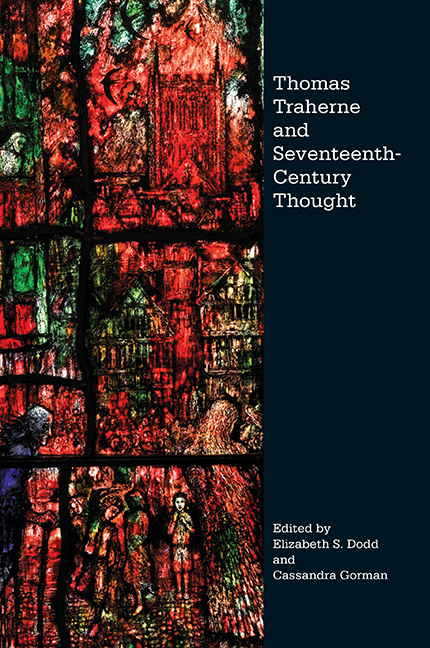Book contents
- Frontmatter
- Contents
- Contributors
- Acknowledgements
- Conventions and Abbreviations
- Foreword
- Introduction: ‘A lover of all Things … An Active ey’ (Select Meditations I.82): Traherne in Context
- PART I PHILOSOPHIES OF MATTER AND SPIRIT
- PART II PRACTICAL AND PUBLIC DEVOTION
- Afterword by Jacob Blevins
- Chronology of Traherne's Life and Contemporary Intellectual Developments
- Bibliography
- Index
- Index of Biblical References
- Studies in Renaissance Literature
Introduction: ‘A lover of all Things … An Active ey’ (Select Meditations I.82): Traherne in Context
Published online by Cambridge University Press: 05 July 2016
- Frontmatter
- Contents
- Contributors
- Acknowledgements
- Conventions and Abbreviations
- Foreword
- Introduction: ‘A lover of all Things … An Active ey’ (Select Meditations I.82): Traherne in Context
- PART I PHILOSOPHIES OF MATTER AND SPIRIT
- PART II PRACTICAL AND PUBLIC DEVOTION
- Afterword by Jacob Blevins
- Chronology of Traherne's Life and Contemporary Intellectual Developments
- Bibliography
- Index
- Index of Biblical References
- Studies in Renaissance Literature
Summary
COMING TO THE MATTER’: A MAN OF HIS TIME
Readers have long considered the concerns of Thomas Traherne's writings to be out of this world, but the author himself was based firmly within it, as an eclectic who drew on all the intellectual resources of his time, and as a priest fully participating in the activities of social and religious life. The essays of the current collection challenge a long-standing assumption that this poet and theologian was unconcerned with his social, political and intellectual surroundings and was somehow – rather unrealistically – ‘out of his time’. This volume seeks to recontextualise Traherne, and to reconsider the most significant themes that characterise his writings within their seventeenth-century background. Revealing the author's debts to his cultural influences is not to undermine the remarkable originality of his work, but rather to affirm it: never has there been a better time to defend Traherne against accusations of mediocrity, or shallow learning. Autograph manuscript discoveries of recent years have brought striking revelations that challenge long-standing assumptions about his philosophical, doctrinal and social interests. The Traherne that emerges is an early modern polymath, fascinated, as he declared on his frontispiece to the Commentaries of Heaven, by ‘ALL THINGS’.
About halfway through The Kingdom of God, an encyclopaedic survey of the natural and celestial world, Traherne dedicates a section to the ‘Moon and Stars, their Magnitude and Distance, Influences, Aspects, and Motions’ (Ross, I, p. 362). He opens with a series of similitudes, establishing clearly that the subjects for study are observable from a human vantage point: ‘The World is like Heaven, God like the Sun, the Moon and the Stars like Saints and Angels.’ Each point of comparison reads as an early modern theological commonplace: earth is made in heaven's likeness and its form bestows the mortal inhabitant with the closest impression of the divine realm; God is a fountain of light, accommodated for human understanding in the sun's beams; humanity can feel awe at the glory of the immortal saints by looking up at the blazing stars.
- Type
- Chapter
- Information
- Thomas Traherne and Seventeenth-Century Thought , pp. 1 - 28Publisher: Boydell & BrewerPrint publication year: 2016

